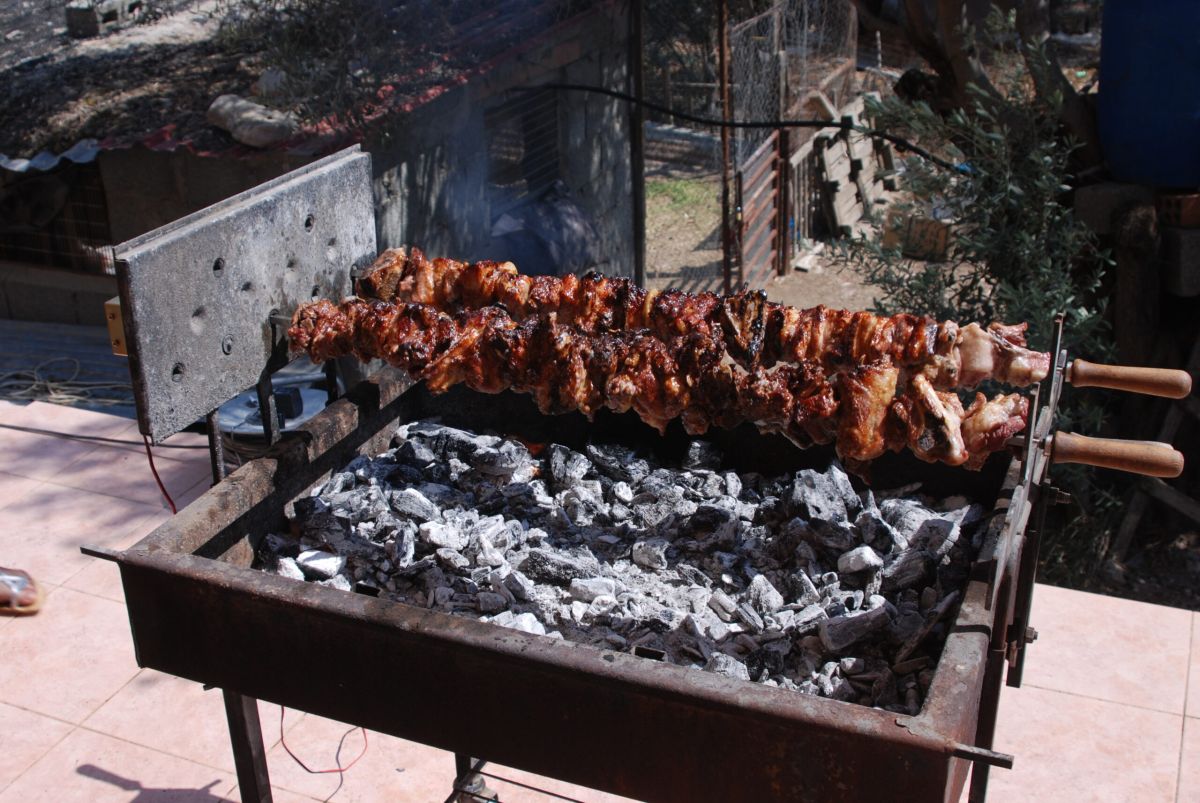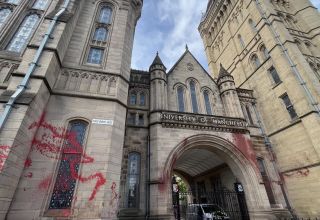Religious holidays around the world: Greek Orthodox Easter
By Joe McFadden

Easter Sunday is perhaps the most important occasion in the religious calendar. All Christians celebrate in accordance with their denomination’s own traditions and interpretation of the Bible however the Orthodox Church likes to do things slightly differently by celebrating Easter on an entirely different day!
In the Orthodox Church (which split from what we know as the Roman Catholic Church in 1054) Easter usually falls a week after the Catholic/ Protestant Easter. This is because the Orthodox Church follows the original Julian calendar, not the widely accepted Gregorian calendar, thus Easter falls on a different day due to the calendar’s differing interpretation of lunar events.
Orthodox Easter is celebrated across the globe but is particularly concentrated in Greece, Cyprus, and Eastern-Europe. Being part Greek-Cypriot, my family naturally celebrate the Holy week according to Greek traditions but the services and theology they are derived from are fairly universal.
Therefore, a Ukrainian, for example, could celebrate Easter in Greece and vice-versa. This is hugely important given current events like the war in Ukraine as it means refugees can practise their faith freely and safely even if there are no churches of their nationality nearby.
How do we celebrate the Holy Week?
The Orthodox Easter period begins similarly to other denominations as it follows traditions associated with Lent. In Greece, Lent begins with ‘Clean Monday’ (called ‘Green Monday’ in Cyprus), deriving from the belief that believers should begin the holiday with a “clean heart”.
Many devout Orthodox Christians undertake fasting in this period, called “νηστεία” in Greek (pronounced nésteia [nee-stee-ia]). Worshippers are expected to give up meat, eggs, and dairy throughout the 40 days of lent – although for health reasons many just give up meat.
There are multiple days devoted to prayer and worship throughout the Easter period. One of these is March 25, the Annunciation of the Virgin Mary, where Mary was informed by the Archangel Gabriel that she was pregnant with the son of God.
March 25 is also Greece’s Independence Day as it was selected as the date to mark the beginning of the Greek 1821 Revolution, an uprising against the occupying Ottoman Empire that would spark the successful Greek War of Independence (1821-29).
Another important day is Palm Sunday as in the Gospels it is the day Jesus rode into Jerusalem. It’s also the beginning of the Holy Week in all Christian denominations. The occasion is marked by a special church service with multiple different services, predominantly Vespers, continuing throughout the Holy Week.
These services culminate with Good Friday, the day Jesus was crucified. In the Orthodox Church the service takes the form of a funeral, beginning at 8pm and ending around 10pm. Halfway through the ceremony the Priest and Chanters lead a procession carrying a large crucifix around the church as if it were indeed a funeral.
This also serves to spread the faith to the community and in the modern era often gets bemused looks from people just wanting to enjoy their Friday night out on the town! They then continue this outside with the entire congregation following respectfully.
An epitaph (ἐπιτάφιος in Greek, pronounced epitáphios [ep-ee-taff-eos]) adorned with flowers is also carried around during this part of the service. It is said to contain the body of Christ and is on display at the front of the church throughout the service. When the procession re-enters the building all members of the congregation go under the epitaph to enter the church.

Photo: WikimediaCommons
Naturally, the biggest church service of the Holy Week is Easter Sunday (which actually takes place on Saturday night) because it is when Christ is resurrected. This year was actually my first time attending the Saturday service as usually I just go on Good Friday because the service properly ends at around 3/4am! However, because I am now a nocturnal student, I decided to attend on Saturday night which was an interesting experience in and of itself.
Saturday’s service begins with the usual praying and chanting but in the run-up to midnight things get interesting. Slowly, the lights are dimmed and candles are blown out until the church is bathed in darkness. At midnight the Holy Light arrives to signify the resurrection. The Priest then uses this Holy Light to light a candle which in turn he uses to light other worshippers’ candles.
One-by-one, the light is spread as each candle is lit until the Church is now bathed in the light and the Son of God now walks amongst us.

Photo: Joe McFadden @The Mancunion
What happens on Easter Sunday?
Unsurprisingly, Easter Sunday is the best part of the religious holiday. It is the time when families come together, eat delicious food, and compete over who has the strongest hard-boiled egg (yes, you read that right!).
First and foremost: The food
To celebrate Easter, traditionally the Greek’s eat lamb with a plethora of sides as it is now time to break nésteia.
Now, my family’s traditions differ slightly from those of mainland Greece as we are actually Greek-Cypriot, so there are some deviations within our cuisine that may not be the case for the mainland and its islands.
Greek-Cypriots’ main meal is called Souvla (σούβλα [suv-la]). Similar to Barbecue, Souvla is chunks of meat cooked on a long skewer over a charcoal fire in a Foukou (φουκού [fu-gu]). The meat is seasoned and cooked for 90 minutes to 3 hours depending on family traditions.
Lamb is the most common meat used for Souvla at Easter but Pork and Chicken are cooked as well. The Souvla is paired with a Cypriot spiced sausage called Loukaniko (λουκάνικο [loo-kan-ee-gu]) and Sheftalia (σεφταλιά [sheft-al-ya]), a homemade sausage, served with Pitta bread and Tzatziki dip.

Photo: Christina Klerides-Maos
For dessert, a traditional Cypriot savoury pastry called Flaounes (φλαούνες [flow-ou-nes]) is served. These are filled with cheese and are very specific to Easter, being prepared earlier in the Holy Week.
After dinner, the family participates in a tradition called Tsougrisma (τσούγκρισμα, pronounced tsoo-grees-mah).
On Holy Thursday, eggs are hard-boiled and dyed red to symbolise the blood of Christ; on Easter Sunday each family member selects an egg at random and then smashes them together (top-to-top and bottom-to-bottom) to determine who has the strongest egg.
When cracking their eggs together the offensive player shouts “Christos Anesti! [Χριστός ἀνέστη]” meaning “Christ is risen” and the defending player replies with “Alithos Anesti [Αληθώς ανέστη]” which translates to “Truly, he is risen”. The winner is the player whose egg remains unscathed throughout all of the play. Following the game, the eggs are peeled and eaten.

Photo: Christine McFadden
My thoughts:
To me, Easter is first and foremost a time for families to come together and celebrate their culture. Personally, my religious views would be described as sceptical at best but, despite my misgivings of organised religion, Greek-Orthodox traditions are still hugely important to me.

Photo: Joe McFadden @ The Mancunion
Growing up Greek-Orthodox, church-going was still an important formative experience. Subsequently, I’ve come to the conclusion that I feel more of an attachment to the cultural element and the community it encompasses rather than any overt religious reasoning. The Easter period is an incredibly busy period for those who are devout believers, such as my Grandmother γιαγιά (Grandmother) and Uncle, and it is their commitment and hard work that makes Easter Sunday so enjoyable for me, my brother, and our cousins.
(I would like to thank my Mother for her patience in assisting me with this article by answering all my questions as I do not know nearly enough about my own culture as my writing here may imply!)







